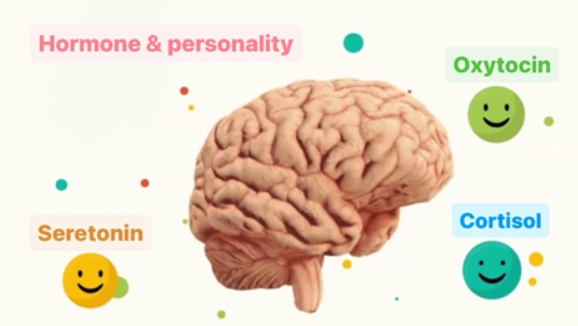Influence of hormone on personality traits
- Soomin Lee

- Jul 25, 2024
- 2 min read
Have you ever wondered why some people are naturally more sociable while others are more prone to social anxiety? The answer may lie in the chemical messengers of our body, hormones. Personality can be uniquely defined by our thoughts, behaviors and emotions. While multiple different elements can shape personality, from heredity to environment, hormones also play a significant role. Hormones are the signaling molecules in the human body that influence our moods, actions and cognitive abilities by interacting with the brain and other biological factors. It is clear that the homeostasis of chemical messengers is the major key to understanding the complexity and originality of personality traits.
To begin with, oxytocin, often called the "love hormone," plays an important role in fostering social bonds and emotional connections. Oxytocin is produced in the hypothalamus and is released into the bloodstream by the pituitary gland. It is released during intimate interactions such as hugging and touching. High levels of oxytocin are related to friendly behaviors, making us more cooperative in engaging with others. Research has shown that individuals with higher oxytocin levels are more likely to trust others and exhibit empathetic behavior. For instance, a study by Kosfeld et al. (2005) found that participants who received oxytocin using nasal spray were more willing to invest money in others during a trust game. The hormone’s positive impact is particularly noticeable in forming and maintaining close relationships with others, shaping a warm and affectionate personality.
Serotonin, a key neurotransmitter and hormone, is essential for mood and behavior regulation. Adequate levels of serotonin enhance feelings of happiness and calmness, while imbalances can result in mood disorders such as depression, anxiety and obsessive compulsive disorder. Individuals with well-regulated serotonin levels exhibit traits such as optimism, sociability, and resilience. In contrast, those with serotonin deficiencies may struggle with mood swings and negative thinking patterns. Therefore, maintaining balanced serotonin levels is necessary for fostering a stable personality.
Cortisol, commonly referred to as the stress hormone, is a steroid hormone that influences our responses to stress and overall emotional well-being. Cortisol is produced by the adrenal glands when we are faced with stressful and scary situations. Elevated cortisol levels cause anxiety, irritability, and mood swings by increasing heart rate and rapid breathing. Chronic stress can lead to persistently high cortisol levels which contribute to traits such as high neuroticism and a susceptibility to anxiety disorders. Conversely, reduced cortisol responses to stress may exhibit more resilience and emotional stability. Hence, the regulation of cortisol plays an important role in forming traits like emotional resilience.
In conclusion, hormones such as oxytocin, serotonin, and cortisol play a vital role in shaping key aspects of our personality by influencing our emotional responses, social interactions, and stress resilience. Hormones biologically influence various personality types, from stress resilience and aggression to social bonding and emotional stability. Researching the role of hormones in shaping personality could develop a deeper understanding of the biological foundations of our behaviors and traits, showing the strong connection between our biological factors and the essence of who we are.




Comentarios